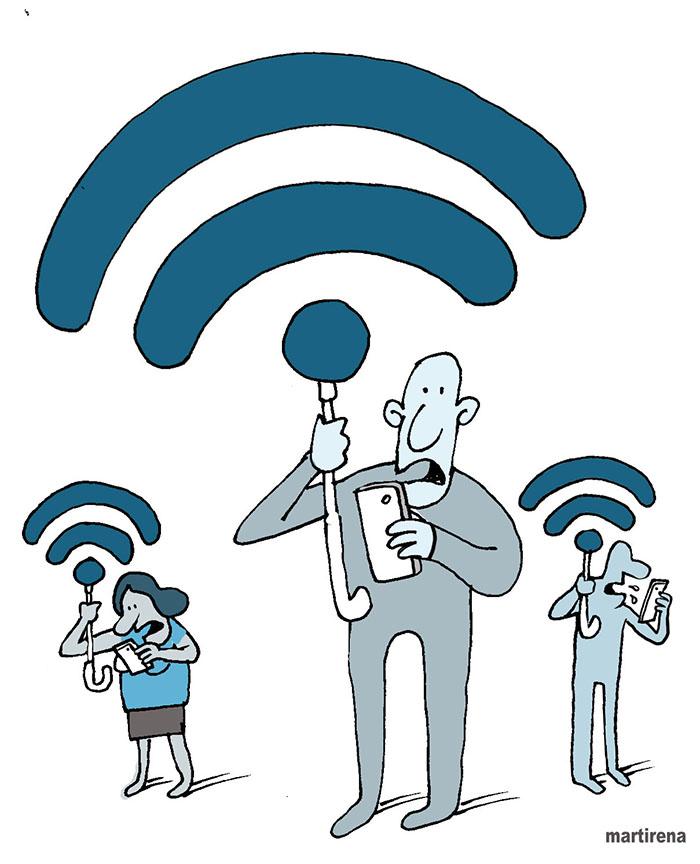
Surveys reveal a decline in printed and televised news, and a public preference in the 21st century for online news. Throughout the 19th and 20th centuries, society’s way of thinking tended to be shaped by the mainstream media of that era: print, radio and television. All indications suggest that this era is over. Trump was elected by attacking the mainstream media in the United States, with only the Fox network supporting him. Similarly, in Britain main media outlets opposed Brexit. Despite this, a slim majority of the public voted in its favor – that was enough for a country-changing decision to carry. Many voters were bamboozled by political spin from the pro Brexit parties and promises to improve public sector services were soon forgotten.
On the other hand, Bolsonaro ran his presidential campaign with an almost total absence of the mainstream media. He criticized the main media outlets, yet was still elected, so what’s new?
What's new are the digital networks, the new technologies at hand. These networks shift the news from big media to computers and smart phones. They take the credit for ‘democratizing’ information by breaking down the ideological barrier that blocked opinions opposed to the editorial media stance. However, the result is that they annihilate the real news.
What television considers important information does not deserve to be highlighted in the interpersonal communication on the Internet. Readers run the risk of losing or not acquiring evaluative views of the news. It may be more important for them to know that their colleague has a new lover than to find out about a coup in a neighboring country or the new law that regulates traffic in their neighborhood.
This personalized information, although a more comfortable, ready-to-wear approach, tends to avoid the more pressing news issues. The interested party is isolated within the social media of Whatsapp, Twitter, Facebook, Instagram, YouTube, Telegram, the messaging services of Google and Periscope. There is no conversational interaction. It doesn't matter what neighboring groups or potential enemies, say. What they transmit does not deserve merit. The only truth is that circulating within the virtual social group with which the Internet user identifies. No matter that this "truth" is fake news, shameless lies or farce. For Internet users, only one dialogue makes sense. Devoid of situational vision, they cling to what their associates propagate like someone who receives information from a divine oracle.
Wanting to change focus is like trying to convince the Aztecs of Cortés's contemporaries that the Sun would rise over the horizon, even if they did not wake up in the early morning to celebrate the rites capable of igniting it. No doubt they would not have dared to run the risk of seeing the day submerged in darkness.
It is about the privatization of the news. This personalized selectivity allows Internet users to lock themselves up with their group in a virtual fortress equipped with aggressive weapons of defense and attack in a faceless response. If you get the version issued by the enemy social media group, it will be immediately repelled, eliminated, or answered with a battery of insults and offenses. It is your group’s duty to disseminate on a large scale the only admissible truth, even if it lacks any foundation, such as the theory that the world is flat.
The effects of this fragmentation of virtual communications are deleterious: loss of overview, discrediting of scientific methods, indifference to historically accumulated knowledge and, above all, total disregard for ethical principles. Anyone who expresses themselves in a language that does not coincide with that of the general group consensus deserves to be attacked, insulted, defamed, and ridiculed.
What to do in the face of this new situation? Disconnect? That would be tantamount to imitating the turtle that puts its head inside the shell and thinks it is invisible. The way out must be ethical and implies tolerance by not responding in the same tone. As Jesus indicated, "Do not cast pearls before swine, lest they trample them under their feet and turn again to rend you." (Matthew 7:6). Merely let them wallow in the mud, but without offending them.
Life is too short to spend time in virtual wars. As for me, I prefer to ignore cyber-attacks and act positively in the real world. Above all, surely the message is that we don’t replace real sociability with virtual conflict and much less, books for memes and apps which personally contribute nothing to my culture or spirituality.








